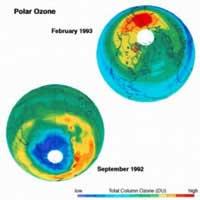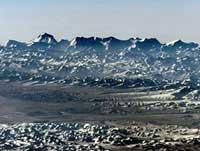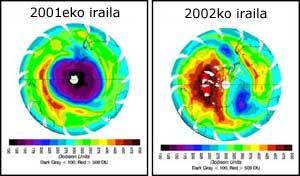Why is there an ozone layer hole in the South Pole?
2001/10/16 Carton Virto, Eider - Elhuyar Zientzia

Curious, right? Paradoxical, of truth. Most CFCs (compounds that destroy the ozone layer) are emitted by the countries of the northern hemisphere, but the ozone layer is mainly destroyed in Antarctica. And this does not happen intentionally with chance; the geographical situation of the hole has its explanation.
Classical explanation Classical explanation
The ozone layer occupies the region of the atmosphere called stratosphere, at altitudes between 10 and 50 km approximately. There are no clouds in the stratosphere, except in very cold regions, that is, around the poles. When the temperature drops below the 80ºC clouds are formed above the 20km of altitude. However, these clouds are not formed by drops of water and, given their special composition, they have a special behavior: under these clouds, the components of the CFCs suffer intense reactions and the derivatives that are generated destroy the ozone layer. The cold temperatures are only given at the poles, especially at the South Pole, and therefore there is a hole.
New explanation New explanation

According to NASA's latest news, the classic explanation seems to have to be added another factor, as some NASA satellites have detected "air waves" that extend across the planet. These waves carry hot air to the poles and are much stronger in the northern hemisphere.
It seems that the land, and especially the mountains, have a great influence on the transport of the waves. The himalayas, for example, is fundamental for the transport of the waves of the northern hemisphere. In the northern hemisphere there is more land mass than in the southern hemisphere and it is much more abrupt, so more waves are generated and channeled to the North Pole. On the other hand, the South Pole reaches less heat and the ozone layer suffers more.
Additional information:
North hole Emergency ozone layer Montreal 87 Basque Country 97

Gai honi buruzko eduki gehiago
Elhuyarrek garatutako teknologia






